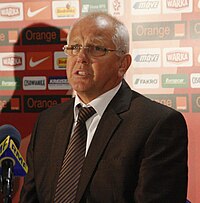Sándor Egervári
 |
|||
| Personal information | |||
|---|---|---|---|
| Date of birth | 15 July 1950 | ||
| Place of birth | Pomáz, Hungary | ||
| Senior career* | |||
| Years | Team | Apps | (Gls) |
| 1968–1970 | Kossuth KFSE | ||
| 1971–1972 | Budapesti Spartacus SC | ||
| 1972–1976 | Budapest Honvéd | ||
| 1976–1977 | Szegedi EOL AK | ||
| 1977–1981 | MTK | ||
| National team | |||
| 1974 | Hungary (olympic) | ||
| Teams managed | |||
| 1993–1996 | BVSC Budapest | ||
| 1997 | Érdi VSE | ||
| 1997 | Al-Ittihad | ||
| 1998–1999 | MTK | ||
| 1999–2002 | Dunaújváros | ||
| 2002–2004 | MTK | ||
| 2004–2005 | Vasas SC | ||
| 2006–2007 | Al Salmiya Club | ||
| 2007–2009 | Győri ETO | ||
| 2009–2010 | Hungary (youth) | ||
| 2010–2013 | Hungary | ||
| 2016 | Diósgyőr | ||
| * Senior club appearances and goals counted for the domestic league only. |
|||
Sándor Egervári (born 15 July 1950 in Pomáz, Hungary) is a Hungarian football manager.
He attended the University of Physical Education in Budapest, and qualified as a football coach in 1983. He has since finished the UEFA A and B course, as well as the Pro license course. He has managed clubs to the domestic title and cup success.
1971–1972 Hungarian First Division – Spartacus S.E
1972–1981 Hungarian First Division – Budapest Honvéd and MTK VM
1974 Member of the national Olympic team
Egervári's coaching career began as an assistant coach in Hungary's last appearance at a world cup. This was in the Mexico 1986 tournament, when Hungary were one of the best European sides in the world. He was assistant coach for the national team for three years in total.
He then had a two-year spell, as assistant coach, to the Kuwaiti national team from 1986–88. Egervári then returned home to Hungary, with a growing reputation as a top coach. He assisted József Both, for a season and then helped György Mezey, over the next two years at Honved, during the years 1988–91, where he helped the Budapest club to two titles among other successes. This was achieved with both managers, in the capacity of assistant manager. Honved also fared well in European competition during his time there.
With domestic success behind him, Egervári moved to the now extinct club, BVSC Budapest. He took over when they were bottom, but worked his magic with them. BVSC were league and cup runners-up in his successful time there. Egervári then spent a short time in Saudi Arabia, coaching Al-Ittihad, before the lure of further success in Hungary followed. In 1998, he took over at MTK and guided them to the title and Hungarian Cup success.
One of his most notable successes followed when he moved to Dunaújváros in 1999. Once again his good coaching skills worked wonders and they were champions in his second season there. Dunaferr also enjoyed success in the European Cup, when they beat Hajduk Split on their journeys. The following season saw Egervári guide Dunaújváros to a runner-up spot.
He then returned to Budapest to once again manage MTK. He brought them the championship in his first year there. MTK also won that year's Super Cup trophy to bring the good times back to the famous Budapest club.
A short stint in charge of Vasas SC then followed, before he packed his bags once more and headed back to Kuwait.
He took the Al Salmiya Club to third spot and also managed to help them finish in the top 4 of the GCC cup.
In 2007, Egervári headed to Győr, in Hungary, and took this club from close to bottom of the league to third spot, and qualification into the UEFA Cup. This was made even more special as it was the first time in 22 years that Győri ETO FC made it into Europe. He helped Győr beat Zestafoni of Georgia, over two legs, before meeting German giants VfB Stuttgart in the next round. His young Győr side suffered numerous injuries, with key captain Peter Stark, breaking his ribs, which resulted in him missing most of the season. Győr also suffered from fatigue after their involvement in the UEFA Cup, and the management of the club decided to do without his services in December 2008.
...
Wikipedia
